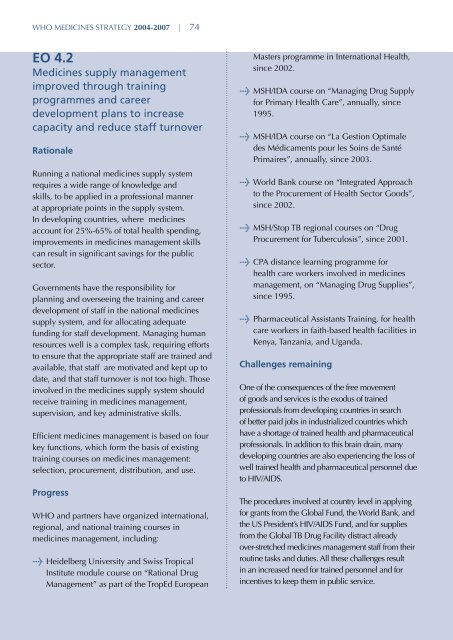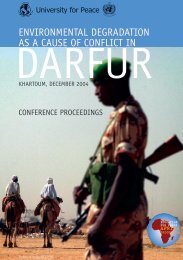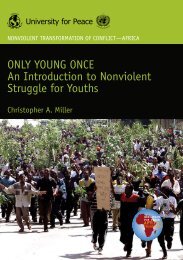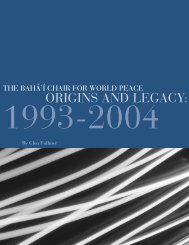who medicines strategy - libdoc.who.int - World Health Organization
who medicines strategy - libdoc.who.int - World Health Organization
who medicines strategy - libdoc.who.int - World Health Organization
Create successful ePaper yourself
Turn your PDF publications into a flip-book with our unique Google optimized e-Paper software.
WHO MEDICINES STRATEGY 2004-2007 | 74EO 4.2Medicines supply managementimproved through trainingprogrammes and careerdevelopment plans to increasecapacity and reduce staff turnoverRationaleRunning a national <strong>medicines</strong> supply systemrequires a wide range of knowledge andskills, to be applied in a professional mannerat appropriate po<strong>int</strong>s in the supply system.In developing countries, where <strong>medicines</strong>account for 25%-65% of total health spending,improvements in <strong>medicines</strong> management skillscan result in significant savings for the publicsector.Governments have the responsibility forplanning and overseeing the training and careerdevelopment of staff in the national <strong>medicines</strong>supply system, and for allocating adequatefunding for staff development. Managing humanresources well is a complex task, requiring effortsto ensure that the appropriate staff are trained andavailable, that staff are motivated and kept up todate, and that staff turnover is not too high. Thoseinvolved in the <strong>medicines</strong> supply system shouldreceive training in <strong>medicines</strong> management,supervision, and key administrative skills.Efficient <strong>medicines</strong> management is based on fourkey functions, which form the basis of existingtraining courses on <strong>medicines</strong> management:selection, procurement, distribution, and use.ProgressWHO and partners have organized <strong>int</strong>ernational,regional, and national training courses in<strong>medicines</strong> management, including:> Heidelberg University and Swiss TropicalInstitute module course on “Rational DrugManagement” as part of the TropEd EuropeanMasters programme in International <strong>Health</strong>,since 2002.> MSH/IDA course on “Managing Drug Supplyfor Primary <strong>Health</strong> Care”, annually, since1995.> MSH/IDA course on “La Gestion Optimaledes Médicaments pour les Soins de SantéPrimaires”, annually, since 2003.> <strong>World</strong> Bank course on “Integrated Approachto the Procurement of <strong>Health</strong> Sector Goods”,since 2002.> MSH/Stop TB regional courses on “DrugProcurement for Tuberculosis”, since 2001.> CPA distance learning programme forhealth care workers involved in <strong>medicines</strong>management, on “Managing Drug Supplies”,since 1995.> Pharmaceutical Assistants Training, for healthcare workers in faith-based health facilities inKenya, Tanzania, and Uganda.Challenges remainingOne of the consequences of the free movementof goods and services is the exodus of trainedprofessionals from developing countries in searchof better paid jobs in industrialized countries whichhave a shortage of trained health and pharmaceuticalprofessionals. In addition to this brain drain, manydeveloping countries are also experiencing the loss ofwell trained health and pharmaceutical personnel dueto HIV/AIDS.The procedures involved at country level in applyingfor grants from the Global Fund, the <strong>World</strong> Bank, andthe US President’s HIV/AIDS Fund, and for suppliesfrom the Global TB Drug Facility distract alreadyover-stretched <strong>medicines</strong> management staff from theirroutine tasks and duties. All these challenges resultin an increased need for trained personnel and forincentives to keep them in public service.











